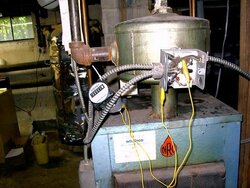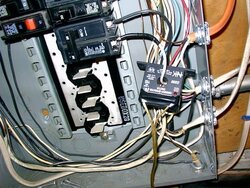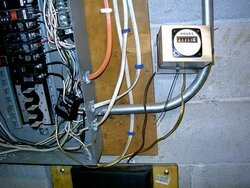Cost to heat DHW with oil
A few months ago, I was reading about how inefficient it was to use a tank-less oil hot water heater, in the past I did not give it that much thought. I did seem to be using a fair amount of oil during the summer just for hot water. It was something around 100 gal every 3 months.
I wanted to get a more accurate measure of how much oil I was using. I picked a cheap hour meter (120V) and hooked it up to the furnace, so it would read the hours the burner was on. You can see form the spreadsheet that it takes 1.08 gallons of oil for DHW (no heating). This is and older model furnace, probably not the most efficient. I have a small single family ranch, no dish washer, wash laundry in cold water, just me living there (teenage daughter stays here on weekends). Hot water requirement should be fairly modest.
I installed an 80 gal electric water heater I picked up on CL for $50, so far it is working well. The water temperature is much more consistent, neither too hot nor too cold.
In the future I am considering adding solar collectors.
I plan to monitor the on time for the electric elements; I have ordered a current switch from E-bay which will have the wire to the heater pass through it, and will turn on the hour meter when power is on to the heating elements. This should give me the information to see if the electric heater is more economical to run than the oil furnace.
Oil used to heat DHW
burner on time
date burner on time hours current oil price
5/9/2009 8:37 AM 0 $2.50 gal
5/18/2009 5:50 AM 11.9
5/19/2009 5:48 AM 13.1
5/20/2009 5:54 AM 14.4
5/21/2009 5:57 AM 15.6
5/23/2009 6:51 AM 17.8
5/24/2009 8:30 AM 19.2
5/31/2009 7:22 AM 28.6
6/1/2009 6:00 AM 29.2
6/2/2009 5:57 AM 30.4
6/3/2009 6:01 AM 31.6
6/5/2009 5:59 AM 33.9
6/16/2009 5:54 AM 45.7
6/18/2009 5:56 AM 48.1
6/21/2009 11:39 AM 51.8
6/23/2009 5:55 AM 54.0
6/25/2009 6:00 AM 56.2
6/26/2009 5:54 AM 57.3
6/27/2009 9:00 AM 58.5
7/3/2009 10:00 AM 65.7
total days 55.00 ave burner on time 1.19
hrs/day
nozzle 0.90
GPM
oil use 1.08 cost/day $2.69
gal/day
oil use 32.68 cost/month $81.71
gal/month
oil use 392.19 cost/year $980.48
gal/year
A few months ago, I was reading about how inefficient it was to use a tank-less oil hot water heater, in the past I did not give it that much thought. I did seem to be using a fair amount of oil during the summer just for hot water. It was something around 100 gal every 3 months.
I wanted to get a more accurate measure of how much oil I was using. I picked a cheap hour meter (120V) and hooked it up to the furnace, so it would read the hours the burner was on. You can see form the spreadsheet that it takes 1.08 gallons of oil for DHW (no heating). This is and older model furnace, probably not the most efficient. I have a small single family ranch, no dish washer, wash laundry in cold water, just me living there (teenage daughter stays here on weekends). Hot water requirement should be fairly modest.
I installed an 80 gal electric water heater I picked up on CL for $50, so far it is working well. The water temperature is much more consistent, neither too hot nor too cold.
In the future I am considering adding solar collectors.
I plan to monitor the on time for the electric elements; I have ordered a current switch from E-bay which will have the wire to the heater pass through it, and will turn on the hour meter when power is on to the heating elements. This should give me the information to see if the electric heater is more economical to run than the oil furnace.
Oil used to heat DHW
burner on time
date burner on time hours current oil price
5/9/2009 8:37 AM 0 $2.50 gal
5/18/2009 5:50 AM 11.9
5/19/2009 5:48 AM 13.1
5/20/2009 5:54 AM 14.4
5/21/2009 5:57 AM 15.6
5/23/2009 6:51 AM 17.8
5/24/2009 8:30 AM 19.2
5/31/2009 7:22 AM 28.6
6/1/2009 6:00 AM 29.2
6/2/2009 5:57 AM 30.4
6/3/2009 6:01 AM 31.6
6/5/2009 5:59 AM 33.9
6/16/2009 5:54 AM 45.7
6/18/2009 5:56 AM 48.1
6/21/2009 11:39 AM 51.8
6/23/2009 5:55 AM 54.0
6/25/2009 6:00 AM 56.2
6/26/2009 5:54 AM 57.3
6/27/2009 9:00 AM 58.5
7/3/2009 10:00 AM 65.7
total days 55.00 ave burner on time 1.19
hrs/day
nozzle 0.90
GPM
oil use 1.08 cost/day $2.69
gal/day
oil use 32.68 cost/month $81.71
gal/month
oil use 392.19 cost/year $980.48
gal/year





 Working on a panel is something even an expert electrician puts in the "scary" category as slips can be seriously injuring or even fatal, although proper procedures will minimize the risks...
Working on a panel is something even an expert electrician puts in the "scary" category as slips can be seriously injuring or even fatal, although proper procedures will minimize the risks... 